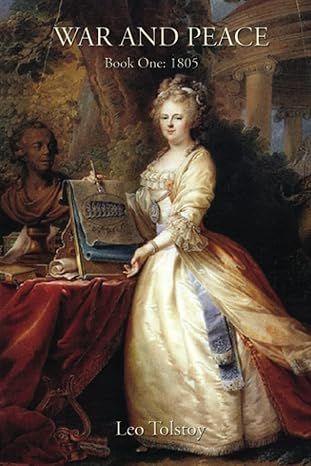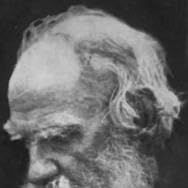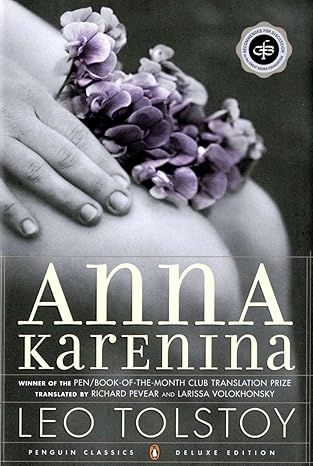War and Peace
4.4 out of 5
2,963 global ratings
War and Peace is a novel by the Russian author Leo Tolstoy. It is regarded as a central work of world literature and one of Tolstoy's finest literary achievements.
The novel chronicles the history of the French invasion of Russia and the impact of the Napoleonic era on Tsarist society through the stories of five Russian aristocratic families. Portions of an earlier version, titled The Year 1805, were serialized in The Russian Messenger from 1865 to 1867.
It was in July, 1805, and the speaker was the well-known Anna Pávlovna Schérer, maid of honor and favorite of the Empress Márya Fëdorovna. With these words she greeted Prince Vasíli Kurágin, a man of high rank and importance, who was the first to arrive at her reception. Anna Pávlovna had had a cough for some days. She was, as she said, suffering from la grippe; grippe being then a new word in St. Petersburg, used only by the elite. All her invitations without exception, written in French, and delivered by a scarlet-liveried footman that morning.
152 pages,
Kindle
Audiobook
Hardcover
Paperback
Audio CD
First published June 12, 2022
ISBN 9781515456346
About the authors
Leo Tolstoy
Leo Tolstoy (1828–1910) was a renowned Russian writer, best known for his epic novels and philosophical works. He is considered one of the greatest authors of all time. Some of his most famous works include:
- "War and Peace" (1869) – A historical novel set during the Napoleonic Wars, it explores themes of history, free will, and human experience through the lives of aristocratic Russian families.
- "Anna Karenina" (1877) – This tragic love story examines the complexities of family, morality, and the conflict between personal happiness and societal norms.
Tolstoy was also a social reformer and a thinker who espoused nonviolence and simple living. He had strong spiritual beliefs, particularly later in life, and became a Christian anarchist, rejecting organized religion and advocating for pacifism, vegetarianism, and the rejection of private property. His ideas on nonviolent resistance deeply influenced figures like Mahatma Gandhi and Martin Luther King Jr.
Read more
Reviews
Chris Cirrincione
5
Impressive book
Reviewed in the United States on January 16, 2023
Verified Purchase
This hardcover version is impressive. I wanted a nice copy for what people regard as the best book ever written in literature. I've read 150 pages of the novel, and it's a page-turner. My only complaint is the small font size, which makes sense because otherwise the book would be well over 1400 pages at size 12 font. Definitely keeping this book for a long time.
Update: I recently finished reading this monster book. Leo Tolstoy certainly had his opinions concerning man's history pertaining to war. In fact, his second epilogue is a tour de force of his personal insight into the behavior of mankind as it pertains to the history of war. The plot of the book is based on Russian aristocracy and how Napoleon's invasion affected this class of people. Book looks nice on bookshelf and was an enjoyable read.
Read more
4 people found this helpful
DantheMan
5
A Truly Good Story
Reviewed in the United States on December 29, 2016
Verified Purchase
I began reading War and Peace as a challenge to myself. I wanted to see if I could do it. Tolstoy's classic novel is famous for many things and brevity is not one of them.
But what began as a personal challenge transformed into something that was both rewarding and refreshing--far beyond what I had anticipated.
We live in the age of instant entertainment. If a story does not capture us within the opening pages, we toss it out. If a television show does not pay out sufficient enjoyment by the first episode, we change the channel. So our entertainment has catered to our appetites. Stories exchange character development for action sequences. Detailed and nuanced dialogue is traded for the flamboyant and the crude. Like fast food we sacrifice quality (depth, insight, meaning) for time.
And also like fast food, we miss out.
Because there is something special about a really long, well told story. There is something to be said for tangible characters the reader can truly know and befriend. Characters that will stay with you long after the story is finished. Just like in War and Peace.
There is no question the complex and realistic characters make War and Peace the classic that it is. As I read, Natasha became my pure and innocent sister I would do anything to protect. Pierre became that old, childhood friend whose defeats I mourned and whose victories I rejoiced. And in Prince Andrew I saw a piece of myself. The same restless heart. The same search for purpose.
These are characters who (just like in reality) never stand still. They are ever being molded by their circumstances, successes, failures, and choices that they make. They are conflicted with a slew of desires, ever competing between their contradicting natures. They have questions. They make mistakes. Some change for the better and others for the worse. Tolstoy gives us a front row seat into their internal wrestlings. There were even times when Tolstoy would describe a character's inner feelings that I felt he had put words to my own.
Additionally, Tolstoy never shies away from taking an honest look into big life questions we prefer to avoid: Questions about life and death. Of greatness and meaning. Of the horrors of war and the emptiness of earthly pursuits. It is his insight into these questions that make War and Peace more than simply entertainment.
War and Peace is a journey. Like a journey it has ups and downs—there are slow parts and there are parts you will stay up to late to read. But be warned: once you finish you may not see everything the same. And that is what makes a story a good story.
Read more
24 people found this helpful
Fitnesspro22
5
A GREAT HUMANITARIAN BOOK
Reviewed in the United States on June 5, 2023
Verified Purchase
A brilliant writing, though written 200 years ago it holds its validity. A true CLÁSIC. A masterpiece describing the hollow, parasite high society in Russia in the 19 century, yet at the same time depicts the intelectual power of those struggling to bring about a much needed change to the Russian people. A great achievement in depicting the human side of the human beings during the Great War in 1812.
Read more
irishbronco
5
Romance Amid Chaos
Reviewed in the United States on September 6, 2021
Verified Purchase
I've been wanting to read this for years. Mostly as a "bucket-list" item or just to be able to say I did.
I regret waiting so long. I've not read anything else by Tolstoy, though I will likely pick up Anna Karenina soon.
The brilliance with which Tolstoy blends prose and fiction with history, philosophy and his own experiences and ideas is possible second to none.
By the end of the novel, as I was wading through the 40ish page thesis lecture on history, philosophy and free will, I found myself daydreaming not unlike Pierre or Natasha about being back at the Battles of Austerlitz or Borodino, or back at the ball where Andrei asks Natasha to dance... Or back hunting with Nikolai and Uncle. Tolstoy's brilliance in character development was seemless. Everyone came into view as easily as an image appears out if the strokes of a master's brush.
The balance between daily life, society, balls, conflict, death and war couldn't have been more evenly penned.
Everyone who claims to be a lover of reading needs to read War and Peace.
Read more
NyQuil012
5
Tough, but worth it
Reviewed in the United States on March 13, 2017
Verified Purchase
What can I say that hasn't been said already about this classic? I guess the only thing that would be to say it's the Game of Thrones of the 19th Century. It's the Breaking Bad or Downton Abbey or Walking Dead or whatever you think is this month's MUST WATCH TV DRAMA, that's what this was for 19th Century Russian audiences. War and Peace is a huge, epic historical soap opera, with intense battles and royal intrigues and historical insight and if you can read it and not be blown away then you're not paying attention. It doesn't have it's reputation simply for being one of the longest novels ever published; it's actually that good.
I find it amusing that, in America, we're taught that the War of 1812 was this huge, massive deal and the Napoleonic Wars are glossed over as just some thing that happened in Europe at the same time while in Europe it's the complete opposite, and for good reason. What was happening in Russia and Germany during the early 19th Century shaped the next 200+ years of world history, the War of 1812, while not insignificant, really didn't mean that much to anyone outside North America. Even the English look at it as a minor skirmish compared to what was happening on the continent. Hearing this story from the Russian perspective makes it's historical import that much more obvious. Add in Tolstoy's incredible characters and impeccable descriptions and you really do have one of the greatest novels of all time, one that sucks you into the period and place and makes you want to know what happens to these people. You feel their pain and rejoice in their victories, even if you have to sit through three chapters of historical background to get back to the story. Somehow it all fits together and if you try to take away any piece, it's just not as enjoyable.
It's not an easy read, especially if you're not a Russian speaker or used to their naming conventions. It can be a bit confusing at first who is who and how they relate. But get the cliff's notes (seriously, it helps) and slog through, it's totally worth the work. I have to say that I have a new perspective on the world after reading this; it sounds pretentious but it opened up a new insight into past events and the mindset of other parts of the world, as well as how that affects our current politics and where things could possibly go. Tolstoy's insight into Napoleon and his musings on world events is scarily prescient, or maybe we're just repeating history. Again.
Read more
13 people found this helpful
Tracey C. Taylor
5
Immersive
Reviewed in the United States on October 19, 2022
Verified Purchase
Three times over the last few months, I heard or read someone saying that War and Peace had been transformative to them. I had made a few fitful starts over the years, but inspired by such testimony, this time I took the plunge. I wanted to be transformed.
Hm, maybe. I do feel that I have just emerged from something big. That the knowledge I’ve gained about Russia, this period in history, the phenomenon of Napoleon, human nature in war time, even the intricacies of family dynamics—is deeper, fuller, and wiser than before. Except for the proud, cruel, and villainous, Tolstoy treats his characters with great tenderness and understanding and insight; he recognizes and reveres the hand of God in the affairs of men, which I appreciate very much. I think I’ll probably be thinking about this book for a long time.
Time spent early on getting all the (very unfamiliar) names straight will pay off in the vast majority of the book. I think my starting this more than once helped, because I ended up reading the first two chapters two or three times. Most of the key players in the novel appear in the opening chapters.
Read more
16 people found this helpful
C. Lira
4
A review of the Kindle edition, not the book itself
Reviewed in the United States on February 17, 2023
Verified Purchase
More has been said and written about War and Peace than most other books, given its age, length, and important position in the world of literature. I don't have anything of consequence to add to that, but did want to provide a suggestion as well as a review of this particular Kindle edition.
My suggestion is this- if you want to read W&P, familiarize yourself with Russian patronymic naming. A man whose father was named Pavlov with have a name like "Sergei Pavlovich Rossokovsky", while his sister might be "Elena Pavlovna Rossokovsky". This sometimes reflected in last names too, so "Bolkonsky" refers to a male family member, while Bolkonskaya refers to a female member of the same famly.
As for this Kindle version:
-
Many of the main characters have their names Westernized. The siblings Marya and Andrei Bolkonsky are named in the book as Mary and Andrew. Why would they Westernize Russian names in a Russian book?
-
The book is inconsistent with that family name, using Bolkonsky mostly, but also Volkonsky.
-
There are a number of places where the text is suddenly italicized for no discernible reason, with weird, misplaced, jagged line breaks.
Read more
32 people found this helpful
Les Gapay
4
Classic, But....
Reviewed in the United States on October 5, 2022
Verified Purchase
Yes, it's a great classic. And supposedly one of the best novels ever written. I have attempted to get through it several times over the decades. Could never do it. Complex and plodding. Too many characters. Too much philosophy. And way too long. Not a real novel, but a combination of history, fiction and philosophy. Tried reading it again with this Kindle edition, but I can't get into it any better than years ago. I liked Anna Karenina and The Death of Ivan Ilyich better. Dostoyevsky and Chekov, I think, are just as great as Tolstoy. Crime and Punishment is the best Russian novel. I hate to say it, but the reputation of War and Peace may be more than it deserves. How can a novel that's hard to get through for most people be the greatest of all time? I'll give it four stars instead of three only because its Tolstoy.
Read more
16 people found this helpful

Kyle L. Rhynerson
3
OK - a battle to get through at times
Reviewed in the United States on July 26, 2011
Verified Purchase
As the title suggests, the book covers two stories of war and peace. I felt the pages of the book were accidentally dropped at some point and put back together as best the author could figure out how they went. This is reflected in the pacing of the book where Tolstoy would mix in his observations of the war from a historical standpoint, and then jump into the narrative of the Russian families. It was frustrating, and hard at times to get into the story because of the abrupt transitions between the two views.
I'm sure there were a lot of subtleties that I missed in this story because I'm not Russian, and I didn't live in the 19th Century; however, I did find the book interesting. In the introduction, the translator Richard Pevear stated Tolstoy's goal was to "tell the truth" about what happened, and I think he did a good job of depicting the harsh realities of war and the impact on families across all social classes.
If you pick up the Pevear and Volokhonsky translation, it might be beneficial to read Tolstoy's afterword because he explains a lot about his writing style and choices he made. He also discusses his thoughts on predestination, which he believed was the force that drove millions of men to war. I personally disagree with his assessment, but I think understanding Tolstoy's viewpoint might make it easier to see what he was trying to say in the book.
Read more
6 people found this helpful
Top Leo Tolstoy titles
Best Sellers

The Tuscan Child
4.2
-
100,022
$8.39

The Thursday Murder Club: A Novel (A Thursday Murder Club Mystery)
4.3
-
155,575
$6.33

Sapiens: A Brief History of Humankind
4.6
-
140,302
$13.49

The Butterfly Garden (The Collector, 1)
4.3
-
88,556
$9.59

Things We Hide from the Light (Knockemout Series, 2)
4.4
-
94,890
$11.66

The Last Thing He Told Me: A Novel
4.3
-
154,085
$2.99

The Perfect Marriage: A Completely Gripping Psychological Suspense
4.3
-
143,196
$9.47

The Coworker
4.1
-
80,003
$13.48

First Lie Wins: A Novel (Random House Large Print)
4.3
-
54,062
$14.99

Mile High (Windy City Series Book 1)
4.4
-
59,745
$16.19

Layla
4.2
-
107,613
$8.99

The Locked Door
4.4
-
94,673
$8.53


